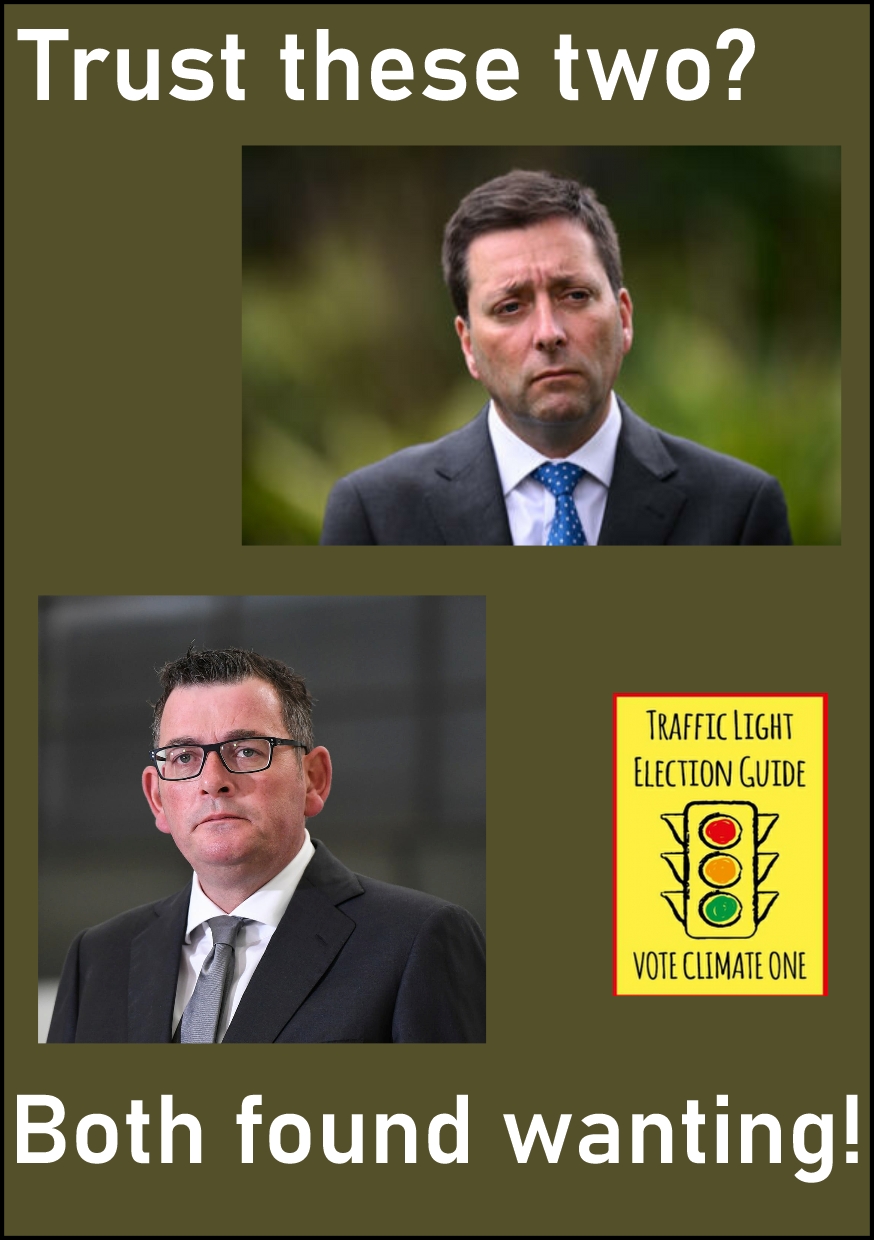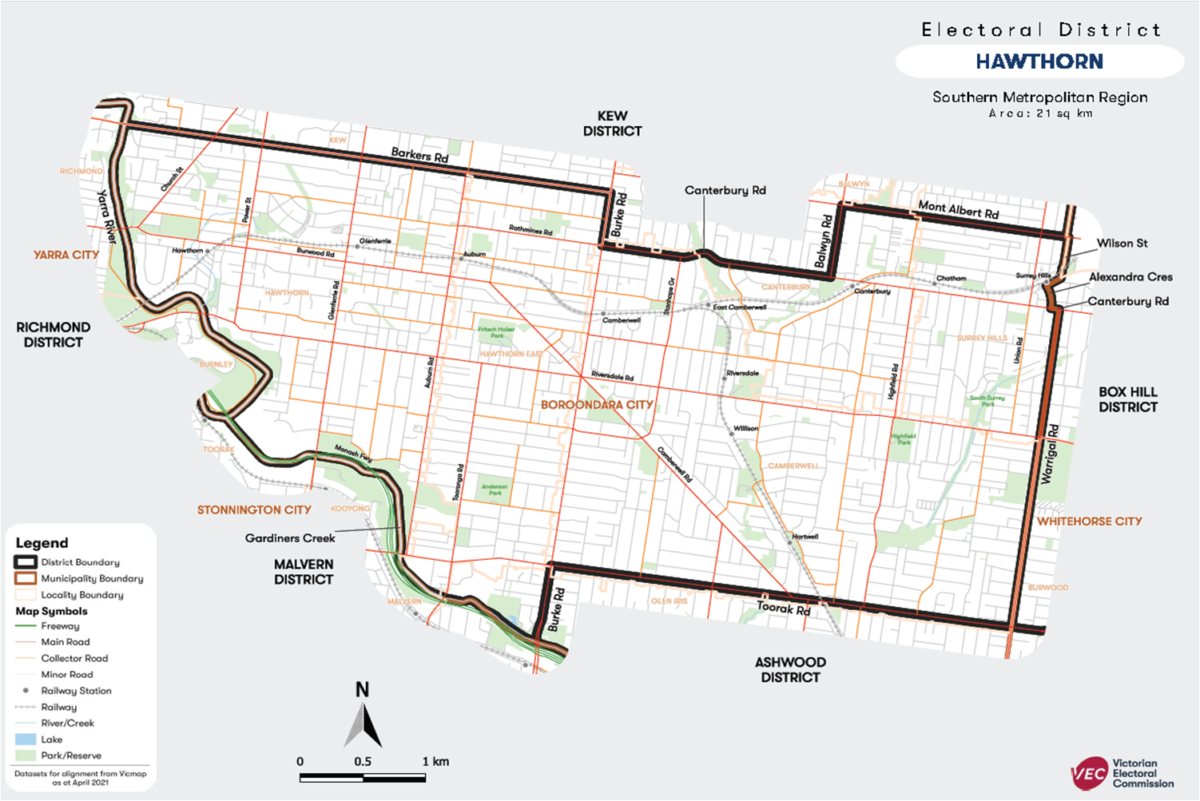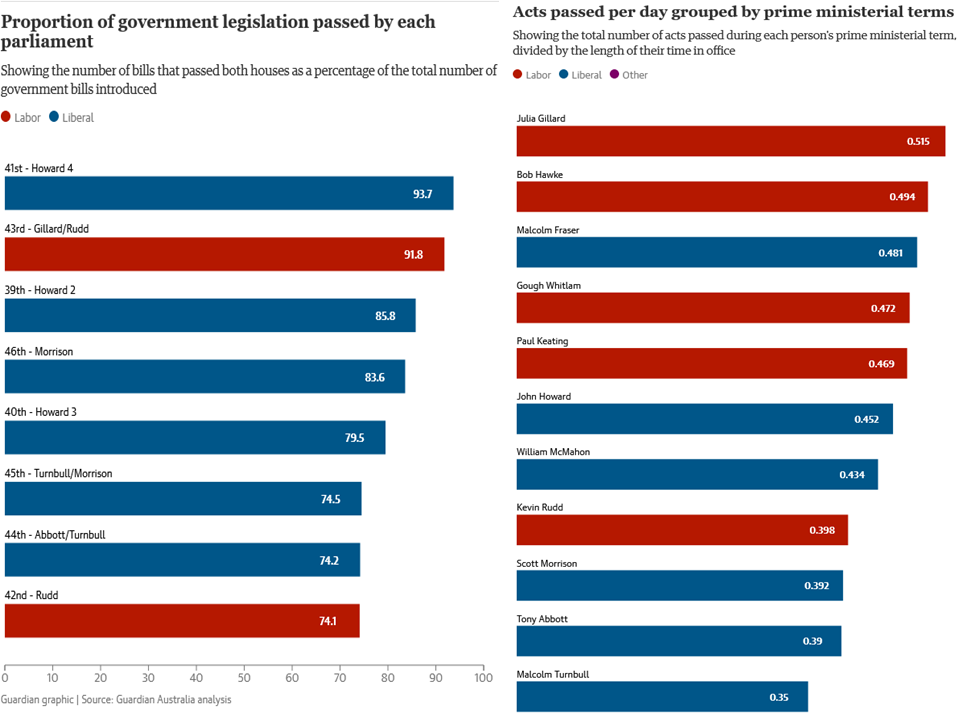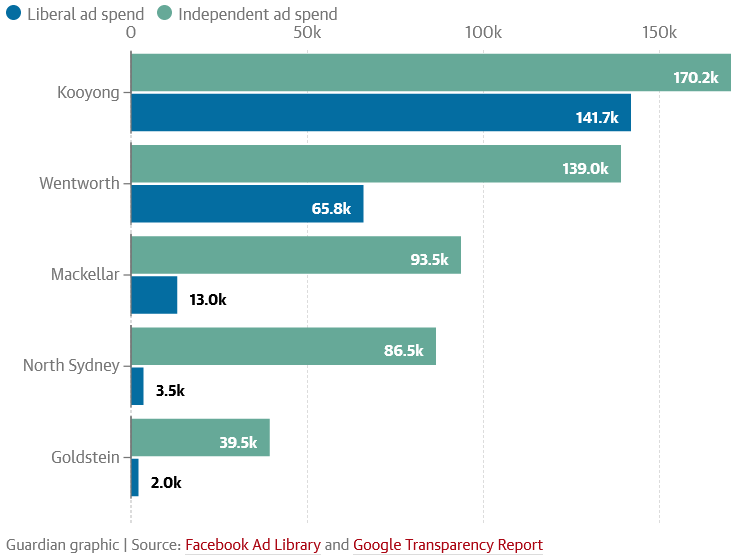VC1 red lights some parties and candidates on ethics
Crooked systems encourage dodgy players
Victoria’s use of politically corrupt group voting tickets for Legislative Council elections fosters unethical parties and practices. In Corruption of ‘Above the Line Voting’ for the Victorian Parliament’s upper house I explained how Victoria’s group voting tickets (GVTs) gives political parties the unbridled power to allocate preferences from every single above-the-line vote they received to whatever other parties or individuals they wanted — irrespective of what the voter might have wished. These allocations were often made with or among minor and micro on the basis of back-room ‘preference deals’ – many of them brokered by Glen Druery, the well known “Preference Whisperer”. See also Malcolm McKerras’s Chapter 6: “The Preference Whisperer” from his unpublished book: UNREPRESENTATIVE SWILL – Australia’s Ugly Senate Voting System, introduced here and here. The following excerpt quoting Druery re the 2019 Federal Election, sourced from Kate Legge’s article from the 16 March 2019 issue of The Weekend Australian Magazine, says it all:
“Voters want disruption and that’s what I’ve given them. I’ve put the butcher, the baker, the candlestick maker, the sex worker into parliament. . .I won’t say my cross bench, that wouldn’t be appropriate, but the cross benchers that are there, that I had a hand in putting them there, all of them except for Nick Xenophon, in one way or another they had my fingerprints.”
p. 7, Chapter 6: The Preference Whisperer – Read the complete article….
Druery did it for money and power. And he has found many takers wanting to be elected under their micro party logos willing to pay him for advice ….. and much more on getting elected.
Monday’s article in the Guardian by Benita Kolovos describes a beautifully just ‘sting’ by the Animal Justice Party that both gives Mr Druery a very black eye, and demonstrates the fundamental corruptness of Victoria’s election legislation still being supported by the major parties. The sting may also represent a win for pro climate-action in the Victorian Parliament. Please read the article:
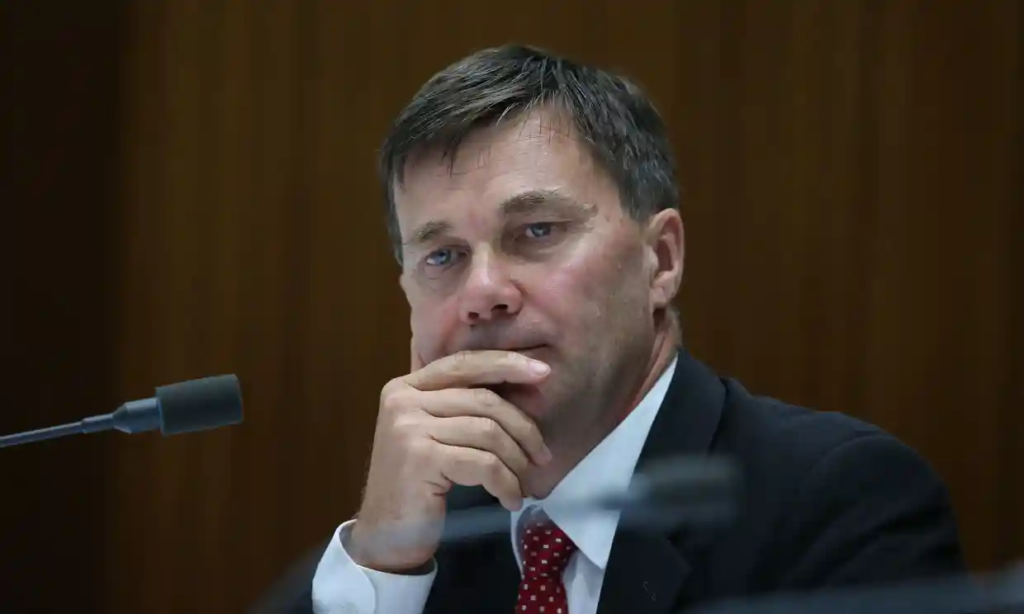
By Benita Kolovos, Mon, 14/11/2022 in The Guardian
Exclusive: Having successfully attracted the support of Druery’s clients, minor party switched its allegiances at last minute
It is, as victim Glenn Druery puts it, the “most elaborate sting in minor party history”. For months the Animal Justice party was “negotiating” with the so-called preference whisper to gain the support of other parties working with him – only to direct its own preferences to others at the last minute.
But for Ben Schultz, the state election manager for the Animal Justice party and its lead candidate in the southern metropolitan region, undermining Druery’s preference arrangements just minutes before group voting ticket registration closed on Sunday was a case of righting what he described as some “wrongs”.
“The Animal Justice party does not agree with the wheelings and dealings of a preference whisperer and the backroom deals of predominantly older, white males. That time has come to an end,” Schultz said.
“It’s time that we move Victoria to full proportional representation and abolish group voting tickets so that we don’t have people like Glenn Druery setting up people.”
Victoria’s Legislative Council is the only jurisdiction in Australia still using a group voting system that allows parties to allocate voters’ preferences [read this linked article too!] when they choose to vote above the line on the ballot paper.
Read the complete article….
In Victoria the politically corrupt major parties have no interest in reforming a system that helps them stay in power. In 2018 despite the Greens polling 9.25% of the Upper House first preferences Greens went from 5 seats to 1, losing all 5 seats they won in 2014 and winning only one new one. By contrast, micro parties won 10 seats, where Derryn Hinch’s Justice Party (where Druery was a paid staffer) won 3 seats with 3.75% of first preferences, Shooters, Fishers & Farmers Vic won 1 on 3.02%, Liberal Democrats won 2 on 2.50%, Animal Justice won 1 on 2.47%, and 3 other parties each won 1 seat with between 1.37% and 0.62%.
By arranging their group voting tickets to ensure that their residual preferences were distributed to a micro party ahead of Greens candidates, Druery’s cabal kept any of the incumbent Greens in the Upper House from being reelected, despite the fact that a fair proportional distribution of preferences would have seen them stay in place.
Many parties will discourage voting below the line, because the law grants each party voted [1] above the line the right to distribute that vote’s preferences as they see fit.
The susceptibility of the legal but politically corrupt voting practice to being gamed by backroom preference swaps gives fundamentally sleazy micro parties a real chance to win the fifth seat in one region in turn for helping backroom swap partners win a seat in another region. Almost any ratbag ego tripper with a burning passion who can con 500 people into signing a nomination petition can enter the race. If enough of ratbags make it to the cross bench in Parliament and hold the balance of power between the major parties, the rabble are then in a very strong position to trade their Parliamentary votes with whichever major party forms government for supporting their respective burning passions.
Although this is all quite legal within the current law, it certainly does not ethically represent the voters’ interests. Major parties have to give out promissory notes to ratbags in order to enact legislation. And, of course, the ratbags have to support whatever other legislation the major party may want to enact irrespective of what their electorate might want — and why should the ratbags care about the electorate? Hardly anyone voted for them in the first place. Any allegiance they owe is to the other ratbag parties in the back room and the preference ‘broker’ they paid and who organized the deal(s) that got them elected.
In our ranking of the minor parties, Vote Climate One does not hold any gains against them that the party may have received from preference swapping. In Victoria, to win you have to play the game. However, this underscores and emphasizes why we warn that if you care about your voting, you must vote below the line!
For the latest information on how the various parties will allocate THEIR “preferences” for distributing YOUR vote in their group voting tickets for the present election, see The Bludger article by William Bowe. Short circuit their dodgy deals by voting below the line!
Who are the ratbags
Vote Climate One has looked at the kind of game the major parties have organized. And, given the nature of the game, it is inevitable that whichever major party is in power will work to maintain the benefits it provides to the leading party. It is now time to look at the parties and candidates sucked into playing the game. Some are basically ethical and some aren’t. But all of them have to play the politically corrupt game if they are serious about getting elected (why else would you run for Parliament?).
I would argue that there are only four fully developed political parties with complete platforms in Victoria: two major parties (Labor, Liberals); and two middle sized parties (Greens – 88 Lower House candidates incl. 3 incumbents and 40 Upper House candidates incl. 1 incumbent; and Nationals – 10 Lower House candidates incl. 4 incumbents and 6 Upper House candidates with no incumbents).
And then, thanks to the possibilities group voting tickets give them for being elected, there are 20 minor and micro parties, including some working to become fully developed, a host of ratbags, and a few ‘community independents’ that cobbled some friends so they could be listed as a party for above-the-line, single choice voting.
Given my background in biology, I cannot help but try to group parties with common features to make them easier to discuss [the color of the bullet in the right hand column indicates Vote Climate One’s Traffic Light assessment of each party]:
| Group name | Characteristics | Parties |
|---|---|---|
| “Don’t tread on me!” | Anarchic libertarians: anti-government, anti regulation, antivaxers, anti-Dan Andrews | ● Angry Victorians Party; ● Restore Democracy Sack Dan Andrews Party |
| “Follow God!” | “Put the family first”: Hard-line conservative values with tendencies towards theocratic enforcement (e.g., anti abortion, public health mandates/anti science, strong policing, militaristic | ● Democratic Labor Party [Catholic]; ● Family First [Protestant] |
| “Follow the Leader” | Personality cults following the founder’s extremist ‘thinking’, generally with a strong law and order and enforcement component | ● Derryn Hinch’s Justice Party; ● [Isaac Golden’s] Health Australia Party; ● Pauline Hanson’s One Nation; ● [Clive Palmer’s] United Australia Party |
| “Follow Mammon” | Pro development (especially fossil fuels, forestry & environment), remove & prevent public health regulations (support ‘alternative’ medicine’ practices) | ● Freedom Party of Victoria; ● Liberal Democratic Party |
| “Single track mind” | Virtually total focus on a single issue | ● Companions and Pets Party [commercial breeding, racing & farming]; ● Legalise Cannabis Victoria [commercialization of cannabis] |
| “Follow the Community” | Party representing a particular ethnic or economic community | ● National Party [rural people and interests]; ● New Democrats [Aspirational Indians & South Asians]; ● Shooters, Fishers and Farmers Party; ● Transport Matters; |
| “Sustaining our Futures” | Party focused on sustaining human welfare into the future — more-or-less in the face of global warming and the climate emergency | ● Animal Justice Party; ● Australian Greens; ● Reason Australia; ● Sustainable Australia Party – Stop Overdevelopment / Corruption; ● Victorian Socialists; |
The following section summarizes where I think each party (excepting the majors, Labor and Liberal) stands in relation to action on the global climate emergency — the only issue that really matters. These assessments are based on my scientific understanding of the crisis, assessment of the parties’ policies and the parliamentary performances of any elected representatives on climate and environmental issues. Finally, the views expressed here are mine, and do not necessary represent those of other Vote Climate One members.
Comments on all the parties
Green Light
- Animal Justice Party: Going along with care and respect for the animals we share a planet with, Animal Justice has a strong policy of care, respect, and protection of our common environment. They also have the best voting record next to the Greens. This is backed up with a very strong policy on the climate emergency.
- Victorian Greens. The Greens have strong, considered, and progressive policies on almost everything founded on humanistic and science-based deliberations. This is backed up with significant Parliamentary experience. Well qualified to inform and stimulate actions to deal with the climate emergency.
- Sustainable Australia Party – Stop Overdevelopment / Corruption: They have initiated legislation in the Upper House to support and empower local government planning policies, which are often negated or overruled by the State Government, or completely disregarded in VCAT and legislation to insert environmental and native species protection into the planning scheme. Further, they have proposed legislation to force responsible authorities who issue permits for developments, large and small, to take into account mitigation and adaptation to climate change. All of these environmental issues have been resisted so far by the major parties. Finally, they have a strong progressive platform with a practical focus on science, technology, government operations including climate.
- Victorian Socialists. The most urgent item on their policy agenda is to recognize the magnitude of the climate emergency and to respond to it in ways that are as fair as possible to those who are directly affected. Overall broad, humanistic, and well thought out policies on climate and many other areas.
Orange Light
- Reason Australia. Focus on humanism and feminism. “Reason commits to backing any policy, from any government, of any political persuasion that will improve the health and wellbeing of women in Australia”. Strong policy on the climate emergency but state explicitly that will horse-trade anything for what they really want.
Red Light
- Angry Victorians. Spinoff of Australian Values. Ego trip for Chris Burson? Victorians “focused on rebuilding the economic and social foundations of our State responsibly, with strong priorities on Mental Health, Small and Family Businesses and our Veteran Community”. Australian Values has reasonable climate & energy policies, but individual candidates seem to have their own independent agendas – especially in Victoria. Not to be trusted on climate.
- Companions and Pets Party. Could equally be placed in the ‘Follow Mammon’ category. I can’t prove it, but it looks like CPP was formed by commercial interests specifically to counter the Animal Justice Party. Mirage News makes this very clear. Not to be trusted on climate.
- Democratic Labor Party. Supports “traditional family values”. See policies: “Energy Affordability” – strongly pro fossil fuel generation and denigrates renewable energy; “Restoring Agriculture” – remove all government controls on land use and farming. Strongly anti controlling anything relating to human ‘freedom’, but for the strong enforcement of biblical sexuality well to the right of the Coalition parties. Would probably fight to stop action on the climate emergency.
- Derryn Hinch’s Justice Party. Derryn Hinch’s policies to harden policing, courts, imprisonment, and tracking for sexual crimes and family violence. Anti-public health regulations relating to Covid. Not to be trusted on climate.
- Family First. Fighting “against the radical anti-family attitudes and policies of modern politics”. Policy supports “family, life and faith” from “radical political correctness”: “Economic freedom for families” strongly and specifically promotes the fossil fuel industry. “Education” – “Centre the curriculum around the basics of reading, writing and arithmetic. Restore the primacy of Western Civilisation and the Australian achievement”. No mention anywhere of environmental concerns or issues. To Hell with climate science and climate action??
- Freedom Party. The movement: “Freedom Party of Victoria is the result of three years of dedication towards building a credible and reliable alternative for Victorians who have suffered enormously under the watch of an incompetent and corrupt government that needs to be changed.” Policy: Energy – deregulate and promote fossil fuel industry; Pandemic Management – repeal all regulations; Timber Industry – protect timber production not the forests; Fire Arms – “gun ownership is a right not a privilege”, “hunting is a divine right” No mention anywhere of environmental concerns or issues. To Hell with climate science and climate action??
- Health Australia Party (HAP). I’ve done a lot of research on this party, because they appear to have a good progressive health policy, but they gave us a slightly ambiguous response to our Climate Lens question as to whether they would “support a national declaration of an ecological and climate emergency.” The assessment committee took this to represent a somewhat ‘libertarian’ response, so I investigated further to reveal a real can of worms.
Much more concerning is that HAP has many features of a personality cult around its leader, Isaac Golden: National Secretary, Victorian President of the party, and First Candidate for the Western Metropolitan Region. [Isaac’s daughter Leiah Golden is the second candidate for this Region]. Questions to HAP candidates in other regions and in the districts, seem to end up being answered by Isaac.
According to several of his autobiographical profiles, after “an early career in finance and financial accounting, Isaac changed career paths to natural medicine and has been a practitioner of “Hannemannian homeopathy” since 1984, and teaching it since 1988. The only educational qualification he lists in his Linked-in profile is his “PhD” on “homeopathic immunizations” from 2000-2004 at Swinburne University. To be completely clear, homeopathy has been proven scientifically many times over to be fake or fraudulent medicine.
The Journal of the Royal Society of Medicine, in its article in its 2006 article, A Brief History of Homeopathy, states: “If there was ever a medical system which cried out for a careful scientific trial it is homeopathy. One of the early trials, carried out in 1835, is astonishing because it was very close to a double-blind, randomized controlled trial, undertaken with great care long before the mid-twentieth century when most of us believed that such randomized trials were first devised and carried out. It showed, incidentally, that homeopathy was ineffective.”
At best, homeopathic medicine is a placebo. Anyone practicing it is either a gullible fool or a total fraud. Isaac Golden has been in this kind of business for a long time and has exploited many different spin-offs (e.g., explore what he is claiming on his Homstudy and other web sites: Isaac Golden Education, Natural Immunization Research, Dr Isaac Golden – World Authority on Homeopathic Vaccination).
I do not think Isaac Golden is a fool. He established the Health Australia Party in 2015 as a vehicle to help deny the science that shows homeopathy to be more than a placebo. See his paper, “A Political Response to Attacks on Homeopathy in Australia” that unequivocally describes his aims for the party.
Beyond Isaac Golden’s practice and promotion of fake medicine, there are a variety of published allegations that Isaac Golden is not a person of good character that that he has not refuted in court. The most telling allegations are in Chris Johnston’s 21/12/1019 article in the Sydney Morning Herald, “Cult member, homeopath, Senate candidate: The bizarre past of Isaac Golden“. Johnston alleged that Golden was a “key member of of a bizarre quasi-religious cult whose leader [Ian Lowe, now deceased] was jailed for sex crimes against the children of cult members”…. “Corporate records show Lowe was a business partner of Dr Golden’s in a Victorian-based natural medicine business called Aurum at the time the child rapes were occurring”. The article provides a lot of additional detail on Lowe and the cult.
Most of HAP’s other candidates I have checked are associated with various alternative medical practices or show some direct association with Golden. The fundamentally narcissistic nature of [Isaac Golden’s] Health Australia Party is also evident in his Official Statement to Party Members of 29/09/2022.
The bottom line is that although Health Australia Party appears to have a good climate policy, nothing they say they will do should be trusted. We recommend that you do not vote for any of their candidates! - Legalise Cannabis Victoria. Other than decriminalizing the sale, possession, and all forms of Cannabis use, the bulk of policy seems to be focused on commercializing all aspects of the plant. The Victorian Party seems to be indifferent to climate issues. We recommend that you do not vote for them
- Liberal Democratic Party. Policies to eliminate government restrictions – especially on fossil fuel development and use and land use. End gov’t support for renewable energy. Minimize uses of gov’t emergency powers. “Every candidate for the Liberal Democrats takes a public pledge to never vote for an increase in taxes or a reduction in liberty if elected.” LDP would probably work to inhibit government responses to the climate emergency. Do not vote for them.
- National Party of Australia. Where Victoria is concerned in terms of their existing representation and 2022 contests, the Nationals for Victoria are clearly an average sized micro party seeking to maintain their representation of country electorates. They say nothing about climate, but surprisingly are offering households subsidies to take up renewable energy: “Our Power to the People Plan will provide 1 million households, including for at least 100,000 rental properties, with a rebate of up to $1,400 for solar panels and $3,000 for a home battery”. Nevertheless, given their affiliation with the Liberals and history in the Federal Parliament, we consider Nationals to be a dangerous choice if you are concerned to see action on the climate emergency.
- New Democrats. This party fits quite well in three different categories.
First, [Kaushaliya Vaghela’s] New Democrats has many signs of the “Follow the Leader” personality cult. She is the an incumbent member of the Legislative Council, elected as the third Labor Party MLC in the Western Metropolitan Region, apparently recruited into the party by Adem Somyurek and was caught in the crossfire following on from the IBAC hearings on “red shirts” and branch stacking. She resigned/was expelled from the Labor party, accusing Dan Andrews’ office of persistent bullying, and went on to establish the New Democrats on 28 July as the Party Secretary. Using her high profile in the widespread community of aspirational Indian and South Asian immigrants, she was able to find candidates for the party to run in all Victorian Upper House Regions and most of the Lower House Districts in the Western Metropolitan Region. As founder and Party Secretary she is the designated contact person for all candidates.
As a Labor MP, Vaghela established herself as “the” representative for this extensive community throughout Victoria and seems to have done a very good job of this. Now, as an independent member of Parliament she with some justification presents herself as the Indian/South Asian community independent.
However, there is little doubt that much of Vaghela’s core policy places the New Democrats firmly in the “Don’t Tread on Me” category of anti-Dan Andrews parties with a strong emphasis on libertarian values.
I have found no mention anywhere that New Democrats have any policy relating to the climate emergency. Even if you are a member of Vaghela’s “Indian and south Asian community”, if you are concerned about the future of your family, we suggest that because of their angry libertarianism the New Democrats will be a dangerous option where effective climate is concerned, and that you put them near the last in your below-the-line preferences. - Pauline Hanson’s One Nation (PHON). The Party is definitely Federal Senator Pauline Hanson’s angry, bigoted and racist personality cult that particularly appeals to the far right fraction of Queensland’s population. Additionally, PHON also provides a trumpet mouthpiece for Federal Senator Malcolm Roberts. I have had several personal exchanges with him over years. Roberts is a ‘retired’ coal mining engineer who is one of the most rabidly antiscientific climate science deniers in the whole Australian Population. PHON’s Climate and energy polices reflect this. Thanks to Roberts, PHON will likely fight climate action tooth and nail. Put them last!
- Restore Democracy Sack Dan Andrews Party. Ex Labor Party staffers and whistleblowers totally focused on removing Dan Andrews. “The Restore Democracy Sack Dan Andrews Party intends to do what it says on the tin, and stands for:” No perceptible interest in climate and energy issues, so probably could not be trusted on climate issues. Put them near the bottom of your preferences.
- Shooters, Fishers and Farmers Party represents and promotes rural libertarians and could just as easily be placed in the “Don’t tread on me” category. Compared to the more measured Federal Policy, The Party’s Victorian policy wants no legal rights for animals, strong limits to councils’ abilities to manage land use and to declare climate emergencies, opposes pandemic related mandates and lockdowns, no limits to land use and forestry, absolutely minimize restrictions to hunting and shooting, promotion of fossil fuel extraction, etc., maximize farmers’ rights to exploit their lands. This Party will clearly try to prevent effective actions against the climate emergency. Put them close to the bottom of your preferences!
- Transport Matters Party (TMP). This party fits clearly in my “Follow the Community” category, as its national policies and those expressed by the Party’s founder Rod Barton, a Victorian incumbent MLC, almost exclusively represent the broad community of transport workers. Unlike other red-light parties, TMP is not especially libertarian or anarchic, and it actually has a reasonable favorable climate and environment policy: federal / Barton. Vote Climate One has given TMP a red-light flag, because of Barton’s voting record in the Victorian Parliament. However, he offers an interesting justification for his support of the EV Road Tax that should be considered:
“In May 2021, I negotiated with the government regarding the Electric Vehicle (EV) road user charge to ensure that there would be a substantial investment and subsidy package in place to encourage EV uptake in the short term. This became a $100 million package that provided 25,000 subsidies for EV buyers and investment in charging infrastructure. Subsidies do not need to be provided once price parity is reached, which is expected to occur anywhere between 2025 and 2030.“
Nevertheless, in other Parlamentary votes he has sided with measures to protect the fossil fuel industry, suggesting that TMP would not reliably support the kinds of climate action we need to save our species. Considering everything, we advise that TMP candidates should still be preferenced near the bottom of your list, but among the least worse of the red-light candidates. - [Clive Palmer’s] United Australia Party Victoria. Definitely multi-billionaire Clive Palmer’s personality cult. A con job financed to the hilt to support his passions: fossil fuel, anti-science (e.g., vaccination, Covid mandates, climate emergency), and general libertarian anarchy. None of his promises can believed. It is very likely that any one he elects will be obliged to fight climate science and any strong action against climate change. Put this party at or near the bottom of your preference list.
How they voted for their parties
The following graphic (prepared by Rob Bakes) shows how minor party and independent incumbents voted on several climate-related issues during the current Parliament. It is discussed in more detail on our How They Voted page.
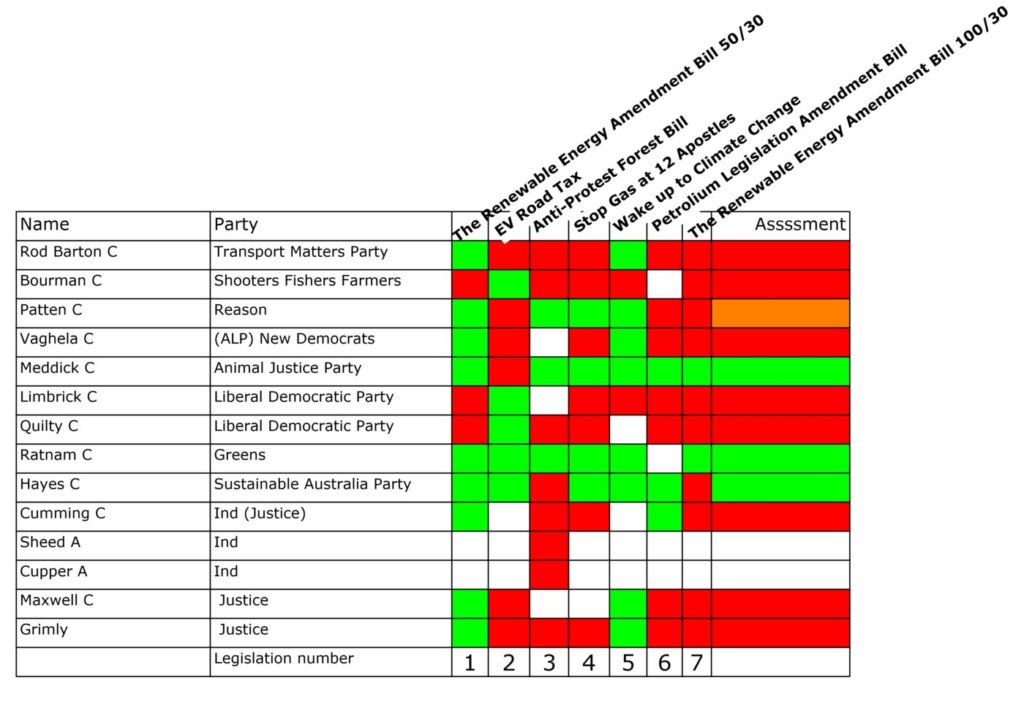
Ranking the many independents
The insidious implications of Victoria’s electoral laws relating to Group Voting Tickets for so called ‘preferential’ voting in the Upper House led to the formation of an unusually large number of parties. We had to spend substantially more effort evaluating parties than we anticipated to understand the legal but highly unethical and secretive preference swapping that gives (and even encourages) microparties to apply the voter’s above-the-line [1] vote to apply THE PARTY’S preferences to elect 4 other candidates in the voter’s region.
Given the large number of micro parties, each of these parties then had the opportunity to endorse their own candidates in many or even all Lower House districts as well. Many of these micro party candidates will have strong anti-climate action biases due to their party affiliations. Also, it is likely some of the independents will be distractors encouraged to nominate by anti-climate major parties to draw votes away from pro-climate parties and independents. And then, there are a large number of genuine “community independents” encouraged to nominate by the success of the “teal” independents in the federal election, where Climate200 supported 23 independents and 10 were elected/reelected. Note that all these independent candidates were nominated by and worked to represent what their local communities wanted from government — Climate200 supported them because they had similar values.
Because the Victorian electoral law gravely minimizes the support independent candidates can receive compared to what major parties can do Climate200 is only able to provide limited support to four candidates in the present election. And even then there is a great deal of misrepresentation from the major parties as to what community independents are.
The fact is that there other community independents running that deserve green-light ranking for their climate policies, but are not necessarily easy to identify because they lack Climate200 support.
The above is a long-winded way of saying the Vote Climate One has lacked the resources in time and effort to rigorously survey all independent candidates for their climate action credentials. Some of these may be flagged with our default red-lights in our Voting Guides simply because we not seen evidence to rank them any other way.
If you are an independent candidate and think you deserve better than we have marked you, please contact us immediately with your climate credentials, and we will reassess your ranking
Hopefully, before Election Day itself, we will be able to complete our assessment of all independents. As this assessment work progresses, rankings updated.
Why are we at Vote Climate One going to all this effort to try to help you?
If we don’t stop global warming soon, we’ll have fueled enough positive feedbacks that runaway warming to Earth’s ‘Hothouse Hell’ state will virtually guarantee human extinction.
However, if we can help get climate savvy governments in power soon enough, they may be able to mobilize enough action so we can survive our accidental disruption of Earth’s Climate System so our kids and grandkids inherit a world they can live in….

